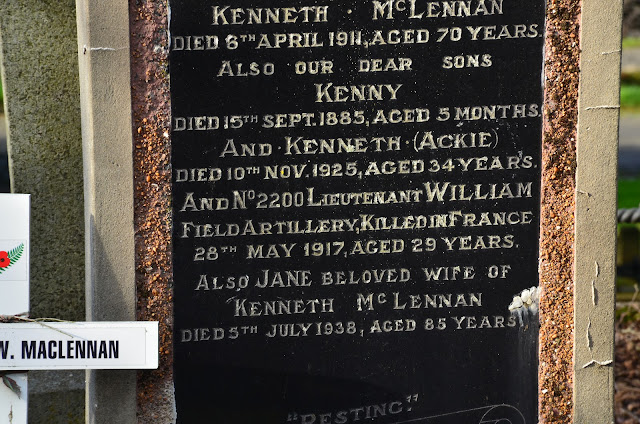KILLED IN ACTION.
Second Lieutenant W. McLennan, reported killed in action in France, was the youngest son but one of Mrs J. McLennan, of Craigleith street, North-East Valley. He was 28 years of age, and before enlisting was employed as a tailor's cutter by Mr J. C. Seelye. He left as a gunner in the New Zealand Field Artillery with the Main Body of the New Zealand Expeditionary Force. He fought through the Gallipoli campaign, and was invalided twice to Alexandria. The deceased subsequently returned to the peninsula, and was there at the evacuation. He then went to France with his battery, and had been in the firing line almost continuously up till the time of his death. About six months ago, during the heavy fighting at the Somme, an enemy shell burst close to his battery, and he suffered from shell shock for some time as a result. He was given a week's leave, and remained in France, subsequently returning to the firing line. Lieutenant McLennan was at one time a member of the Union football Club, and played in the Second trade matches. He received his commission on the field some months ago. The youngest son, Kenneth McLennan, left New Zealand as an infantryman with the Fifth Reinforcements, and is at present "somewhere" in France. -Otago Daily Times, 9/6/1917.
BURNS CLUB
The Burns Club gathering last evening was well attended. The Chairman (Mr W. B. McEwan) spoke with regret of the death of three members of the club — the late Mr Booth, and two soldiers on active service, Second Lieutenant McLennan and Farrier J. Jack. He extended the club's congratulations to Mr and Mrs Dunn on the occasion of their jubilee of married life. Mr E. Gilkison, in speaking of 'Scotland and the War,' said that never before had Scotland been so powerful and glorious as she was to-day. The forces engaged at Bannockburn and Flodden were as nought compared to the number of Scots who were fighting in France today, and their record ran from Mons to Messines. "No soldiers in the world," said Lord French after a particularly fierce fight, "could have done what you have done." -Evening Star, 21/6/1917.
William McLean was killed at a time of intense artillery preparation for the Battle of Messines. Continual destruction of German defences was the aim of the artillery preparations and there was a fair amount of retaliation. The Official History the the NZ Field Artillery says: "The same areas were shelled on the night of the 26th, and back areas were swept with fire for several hours. We suffered a good many casualties by these bombardments, the progress of work was often seriously hindered, and dumps of ammunition, some of them containing thousands of rounds for the field guns, were blown up; but these were checks not unforeseen that in no way stayed the momentum of events."


No comments:
Post a Comment